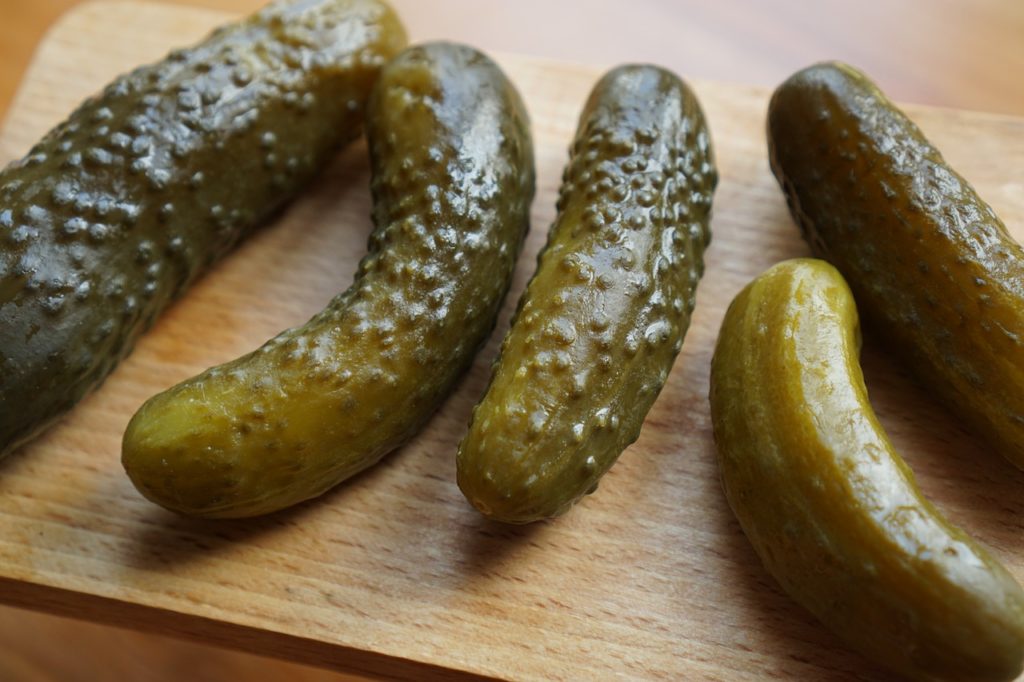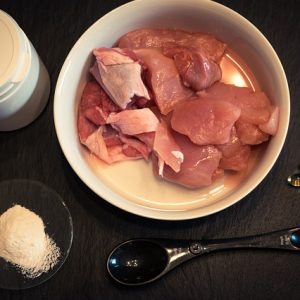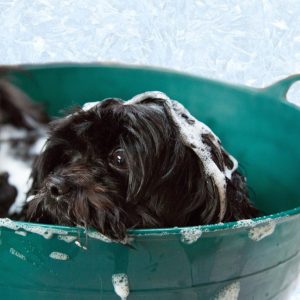During summer grilling season, you’ll almost always find jars of pickles on the picnic table. The crunchy treat goes with everything. You can slice them up for hamburgers or sandwich toppings. And, of course, plenty of people eat them on the side. (Not me – I’m not a pickle fan) They come in various flavors, and people often make their own. You know zucchinis are safe for dogs to eat. So you’ve probably wondered, “Can dogs eat pickles?” After all, aren’t pickles fancy cucumbers? (You already know cucumbers and zucchinis are related) The answer isn’t that easy. Pickles contain plenty of extras dogs DON’T need. So, realistically, dogs shouldn’t eat pickles. And we’re going to dive into the reasons why not.
Pickles
The most basic definition of a pickle is a cucumber preserved in brine, vinegar, and herbs or spices. Of course, you can use the same process on ANY vegetable (though, technically, cucumbers are fruits), but people usually think of cucumbers when they think pickles. You’ll find recipes ranging from sweet to spicy and everything in-between. And most families have at least one treasured formula they hold close.
Because of the cucumbers, pickles don’t pack on the calories. And they DO bring plenty of vitamins and minerals with them. However, they also carry all of that briny sodium. It’s a careful balance most people can’t resist. In 1 cup of chopped dill pickles, you’ll find:
- Calorie: 17.2
- Carbohydrates: 13.4g
- Protein: 0.9g
- Minerals:
- Calcium: 60.1mg
- Iron: 0.5mg
- Magnesium: 10mg
- Phosphorous: 17.2mg
- Potassium: 132mg
- Sodium: 1251mg
- Vitamins:
- A: 5%
- B6: 2%
- C: 2%
- E: 1%
- K: 70%
When dogs eat pickles, they get WAY more sodium in their diet than they need. Even one bite goes over their daily requirement. As Dr. Carly Fox, a veterinarian at New York’s Animal Medical Center, states, “Although pickles contain vitamins and minerals beneficial to us, the negative aspects far outweigh the benefits for a dog. Overall, they aren’t a great choice to feed your dog.”
Can Dogs Eat Pickles?
Does that meant dogs CAN’T eat pickles? The answer isn’t black and white. The problem comes down to the pickle recipe. What’s on that ingredient label? You already know the salt content’s a problem, but what other potential issues lurk in that jar? After all, you’re not offering your dog a cucumber (which is fine, by the way). A bite of one pickle may not be a problem, while a bite of another could land your dog in the hospital. This is why you’re honestly better off AVOIDING the issue of dogs eating pickles. It keeps everyone safe.

Problems When Dogs Eat Pickles
You probably have a favorite pickle you turn to. Or maybe your choice depends on what you’re eating. Pickles can have spicy tastes, or they can stick to the typical sour flavor. And some even have a sweet bite. That’s where problems arise when dogs eat pickles. Everything that makes those recipes so appealing may spell trouble. Different spices, herbs, and other vegetables may cause health issues. If you don’t read through EVERY ingredient on the label (or ask the person who bottled the jar), you may end up with an incredibly sick pup. When confronted with a pickle of unknown origin, DON’T let your dog near it.
Dill Pickles
Dill pickles are one of the most popular out there – and one of the most basic recipes. All you do is add dill to the usual pickle jar. Dill brings antioxidants and some antibacterial protection. The herb itself is perfectly safe for your dog to consume (cats can have dill, too!). However, you’re still confronted with that insane sodium level. On average, dogs only need 13.3mg of salt per day. If you look at the math, your dog’s going to go over. It’s risky for dogs to eat dill pickles.
You can certainly offer your dog FRESH dill if you want them to enjoy the herb’s benefits. Mixing it into their food won’t cause any problems. It’ll also give you the bonus of freshening their doggie breath a bit. (You’ll still want to keep up with your toothbrushing routine, of course – dill isn’t a substitute for that!)
Bread-and-Butter Pickles
For people craving a little sweetness, they often turn to bread-and-butter pickles. The recipe here is more complicated. You add sugar, peppers, onion, garlic, and a blend of spices. Dogs CANNOT eat these pickles. The ingredient list contains TOXIC ingredients. Namely, onions and garlic. Occasionally, the spice blend also features nutmeg. Nutmeg and dogs DON’T agree.
Granted, the amounts of these ingredients aren’t likely to cause severe toxicities. However, do you want to take that chance? Your dog can still end up in the hospital. Combined with the problem of sodium, you’re better off avoiding bread-and-butter pickles in the first place. It’s a precaution against more severe issues.
Spicy Pickles
Moving down the line, some people prefer spicy pickles. This recipe combines chili peppers and aggressive spices. And dogs? They don’t have stomachs designed to handle spicy foods. You’ll want to check the spice blend used (not every spice is dog-friendly), but when dogs eat pickles that pack a kick, you’ll often see GI upset. They don’t tolerate the heat. It isn’t fair to make your canine companion so miserable. Skip the spice.
Fermented Pickles
While not as common, some people ferment their pickles these days. Fermented pickles produce natural bacteria that behave as probiotics – in humans. However, it’s important to remember that every individual has their own microbiome. Your dog WON’T tolerate ingesting fermented pickles the same way you will. If you want them to enjoy a happy GI tract, stick to probiotics designed for dogs.
Safe Ways for Dogs to Eat Pickles
You make your own pickles at home. You know the recipe, and the ONLY things in it are the brine, vinegar, and some dill. (Oh, and the cucumbers, of course) Is it okay if dogs eat those pickles? Yes – in SMALL bites and NOT very often. Remember, those pieces of cucumber are swimming in salt water. And you don’t want your dog’s sodium to shoot so high they end up with problems. Keep plenty of the water close by.
Signs your dog’s salt has gone up TOO fast include:
- Excessive thirst
- Vomiting/diarrhea
- Difficulty with balance
- Seizures
However, if you want your dog to get all of those healthy vitamins and minerals, WITHOUT worrying about calculating the salt? Stick to ordinary cucumbers. Just go easy on the amount. Cucumbers carry A LOT of water, and if your dog eats too many, they may develop runny stools.
In the Brine
Pickles add different flavors and textures to your meals. And with limitless options for ingredients – veggies, spices, and herbs – you can make any kind of pickle you want. But the sodium (not to mention some of those ingredients) poses a problem for dogs. You’re better off NOT allowing dogs to eat pickles. It’ll keep your dog safe. You CAN offer ordinary cucumbers and still give your pup those vital minerals and vitamins. It’s a nice unsalted compromise.













No comment yet, add your voice below!